5 Movie Series That Ended Up Awesome (After Terrible Starts)
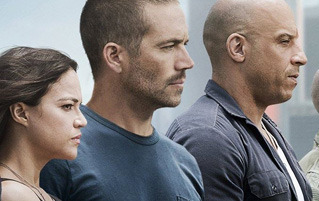
As tough as it is to create worthy sequels to great cinema, it's nearly impossible to take a terrible movie and, while staying in the same franchise, improve upon it. Many movie plots deal with an underdog story, but that's difficult to pull off in real life when the first film is a narrative at the height of its power and later films feature ideas like taking Jason to Manhattan or are called Batman Forever.
The following are rare examples of series that would eventually turn great but that started off as pathetic experiments in seeing what happens when you give inept people cameras and tell them, "It's cool." Please understand that most of these enhancements are the work of pure witchcraft and should not be attempted unless you have hit the dire straits of being forced to follow 2 Fast 2 Furious.

My first exposure to the Fast and the Furious franchise was through a yearbook in which an angry 17-year-old wrote to my friend (who was, at the time, dating that angry teen's ex-girlfriend): "You break her heart, I'll break your neck." If you're unaware, that is a line spoken by Vin Diesel, and it is the pinnacle of clever dialogue in the first two films of the series. I don't think there is a better reveal of someone's character than them trying to threaten another person with Vin Diesel quotes in the back pages of the Ronald Reagan High School 2006 annual.

He was later voted "Most Likely to Live His Life a Quarter Mile at a Time."
The Fast and the Furious and 2 Fast 2 Furious (aptly named, as it was operating at a level far outside of the realm of any normal human critic's judgment) are car porn blended with a healthy mix of sleeveless shirts and topped off with CGI that looks to be from 1980. Some series take a while to establish the laughable stereotype that they will become, but The Fast and the Furious did it almost immediately. It is, in itself, every parody of the film that will ever need to happen. The films all made a ton of money, and it was the most expendable action franchise of the 2000s, holding strong in that spot until a new series came along that actually declared itself expendable.
Whereas the first three films focus primarily on street races and the people with a lack of screen presence that love them, Fast & Furious, along with Fast Five and Fast & Furious 6, took all the vroom vrooms and implemented them into what would become, basically, heist films, a far more exciting route than having characters frown at each other in between screeching tires for 100 minutes.

Now they drink beer and seizure-smirk at each other.
Secondly, they created a stronger overarching theme, primarily based around the importance of Vin Diesel's favorite word in the series ("Family," Diesel said thoughtfully, doing something with his mouth that sort of looked like smiling). And, to top it off, they added Dwayne "Don't Call Me 'The Rock' OK Maybe Just Once" Johnson, a human cartoon character who provides the kind of macho, self-aware performance that really anchors the tone of the series.
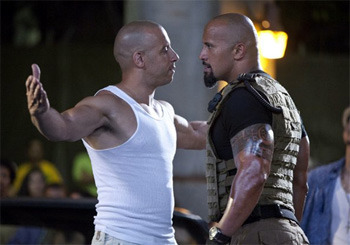
And single-handedly saved the baby oil industry.
The films are filled with more ludicrous situations than ever, but rather than the overly serious manner of the early efforts, the recent installments seem to be approached with a sincere embrace of all the booming, ridiculous action. The cast and crew are cognizant of the insanity of parachuting cars out of a plane in order to chase a bus, and they're prepared to make it the most entertaining, well-constructed scene of parachuting cars out of a plane to chase a bus that you've ever seen. I predict that Furious 7 will be Ludacris' first foray into the Criterion Collection.
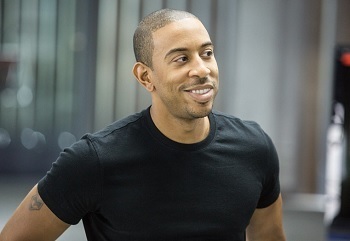
Sorry, make that Academy Award-winner Ludacris.
Gamera

By the mid-1960s, Toho Co.'s Godzilla had been able to shed his whole "nuclear weapon metaphor" shtick and had settled into defending Japan from all the King Ghidorahs that Planet X could throw at him. He was also immensely popular with children, which sent competitors, most notably Daiei Film Co., into a race to create their own protagonist monster that could slaughter the world's remaining population of irradiated beasts. Basically, Japan's version of Vin Diesel.

Don't you dare tell me you can't see the resemblance.
Gamera, whose original series of eight films had the combined effects budget of whatever could be dug from an unlucky production assistant's wallet, was Daiei's invention. While he was also beloved by the loud masses of kids who thirsted for the giant turtle to spill the blood of any alien that thought of Earth as a welcome pit stop, he could not prevent Daiei from going bankrupt in 1971.
Though Gamera would come back in 1980 for a film called Gamera: Super Monster, which loosely formed a plot out of copious stock fight-scene footage from the previous films, his honorable return happened in 1995 with Gamera: Guardian of the Universe. By this point, Godzilla had also had a renaissance, but that franchise's return had been marred by Toho's reliance on infusing those movies with tropes from famous, recent American blockbusters, whether those blockbusters be Aliens, The Terminator, Jurassic Park, E.T., or Hot Cock 4: Slippery When Wet.
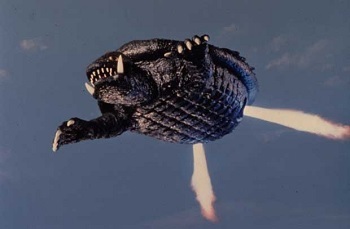
Little-Known Fact: Gamera's flight is powered by ejaculation.
The '90s Gamera trilogy is the best example of suitmation (actors wearing monster suits) ever put on film. While it's very easy for suitmation to end up looking like a poor stuntman arthritically trying to kick his way through a cardboard diorama, the '90s Gamera films blend suitmation and CGI in a way that best uses the advantages of both. This is especially evident in the fight scenes, which are far more engaging than the Godzilla rumbles of the time, in which two monsters shoot rays at each other until one falls over and the other remains stationary until the resolution. Much like the aforementioned Hot Cock 4.
They're serious in tone, which is a massive step above the bleating elementary-schoolers that Gamera joyously saves in 1968, and they manage to be ambitious in a way previously unseen in the giant-monster movie genre. Prior to this trilogy, the most ambitious thing in monster films had been resisting the urge to make another cheap sequel.
Twilight

"Still a better love story than Twilight!" the man said, not realizing that it was already over.
Jokes about Twilight? What is this, the years 2005 through 2013? But, through a near decade of punchlines about sparkles and longing glances, I still don't think anyone has done justice to the fact that the first two films in the Twilight series are incomprehensibly designed to be the bare minimum of filmmaking. The kind you learn about in the instruction manual of a hand-me-down video camera.

And then you miss the page about the red-eye filter and the whole thing ends up looking silly.
The cinematography is bland, the lighting is an angry rebuttal to the lighting technician's portfolio, and the stories, which can barely bother to build any kind of drama or tension, simply stumble through plot points that are irrelevant to everything that a normal person would find interesting. The Twilight Saga: The First One Named Twilight and The Twilight Saga: New Moon are runaway trains in the most miserable sense of the word. There is no part of them that doesn't suck. Even the fact that actual people could go into a theater and physically see them without them karmically, and impossibly, wiping themselves from existence is a strike against them.
The last three Twilight films are far from what most would consider great, but in comparison to the first two, they're Ingmar Bergman wrapped in a warm blanket of Fritz Lang. Eclipse is directed by David Slade, whose filmography ranges from the awesome Hard Candy to six episodes of Hannibal, which NBC created solely to give all other TV shows something to aspire to. In a series of films set in a small town, surrounded by postcard-worthy vistas of woods, Eclipse is the first to give the faintest semblance of scale and beauty. This is a welcome change from New Moon's apparent insistence on filming only things that adhere to the single production note given to the cinematographer: "Taylor Lautner, and maybe some leaves if they happen to be in the background."

"Great, now edit out Stewart and replace her with a second Lautner. And change the leaves to abs."
The final Twilight film, Breaking Dawn Part 2, is the only one to have any real emotional poignancy. The other films have a grand amount of emotional shit going on, but it is all blundering, middle school melodrama, which practically yells, "Look at all of their forbidden love! Please care about what is going on!"
While it's easy to get carried away with the embittered feelings left by what Twilight and New Moon did to you and your families, Breaking Dawn Part 2 at least presents portrayals and scenarios that you can imagine yourself caring about. And when a Twilight film gives you something that, in a more loving world, you can envision yourself being positively affected by, that is when it has truly succeeded.

I give this 4 out of 5 stars in Universe #271-Beta, where it provides
welcome relief from the oppressive rule of our robot overlords.
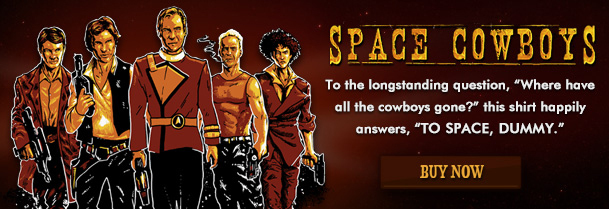
The Devil's Rejects

House of 1000 Corpses is Rob Zombie's attempt at making The Texas Chainsaw Massacre, and it totally shows, because House of 1000 Corpses is what would happen if Chainsaw director Tobe Hooper had once written a song about digging through ditches, burning through witches, and slamming into the back of the Munster race car. To call it a movie means dismissing the plotlines of every other movie that's ever happened, before or since.
House of 1000 Corpses becomes a bloated mess of nonsense before the opening goddamn credits are over, and the best scene in the entire thing is a sequence in which Walton Goggins is shot in the head. When the height of a film is Goggins being removed from it forever, you know that the rest is an assault on your logic. It's 88 minutes of telling the people in the theater, "You paid to see this, and FUCK YOU for having hope."
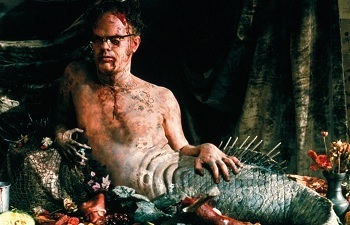
If you turn on closed captioning it just says "YOU BROUGHT THIS UPON YOURSELF."
This is the shortest series on this list at only two films, but it is definitely the oddest turnaround. While House of 1000 Corpses was the feature-length music video that no one knew they didn't want, The Devil's Rejects is one of the best horror films of the 2000s. Watching 1000 Corpses is like walking through those haunted mansion rides that are immensely prevalent at Southern county fairs, not just because of the garish visuals and incoherent tone but because both have equal amounts of hillbillies screaming at you. The Devil's Rejects has flow and pacing, two features that are nonexistent in Corpses.Corpses feels like Zombie picking ideas out of a hat, and Rejects, while manic, is Zombie laying those scraps of paper on a table and asking himself, "Now, what if I tried to make a script out of this?"
Most importantly, there are themes in The Devil's Rejects, and the movie raises questions to the audience about morality and the nature of evil. It also includes a scene about the nature of fucking chickens, but those two minutes of what could be considered throwaway dialogue are more entertaining than the entirety of Corpses, where dialogue is just Zombie performing clumsy foreplay on better horror films from the 1970s.

And it gives you something to talk about on date night.
The Devil's Rejects is, despite Robert Rodriguez's and Quentin Tarantino's endeavor, the closest thing we've gotten to a grindhouse film in recent years, and while Zombie still struggles with taking his visions and applying them on-screen, he nearly nails it perfectly with Rejects.
Universal Soldier

Universal Soldier is probably the most perfunctory action film of the early '90s. A science-fiction plot that crumbles under any serious scrutiny? Check. "Witty" dialogue that seems archaic now? Check. Dolph Lundgren? Check. Jean-Claude Van Damme and Jean-Claude Van Damme's bare ass? Oh, you had me at hello.
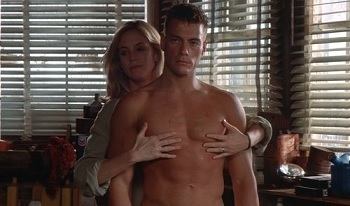
Everyone, regardless of their sexuality, is jealous of Ally Walker in this scene.
The series continued its perfunctory legacy with two direct-to-video sequels that the original cast had no involvement with: Universal Soldier II: Brothers in Arms, and, since action films sound the most appealing when they have titles akin to bad wrestling pay-per-views, Universal Soldier III: Unfinished Business. Naming your movie Unfinished Business is like drilling for oil and getting nothing but pee. A fourth entry, Universal Soldier: The Return, which ignores the second and third films, was released in 1999 and brought back Van Damme to face Michael Jai White and Bill Goldberg, in what sounds like a plot synopsis intended to teabag the gaping mouth of nostalgia.
The Universal Soldier series had reached its darkest hours. No one noticed or cared.

Especially not the people responsible.
And then John Hyams, son of Timecop director Peter Hyams, descended from whatever corner of heaven he'd been hiding in and brought us Universal Soldier: Regeneration. Regeneration didn't have a high bar to reach when it came to surpassing its predecessors, but it completely smashed through that bar, announcing its dominance over every action film within hearing range.
Then, uncomfortable with just being a perfect, loving god, John Hyams gave us Universal Soldier: Day of Reckoning.
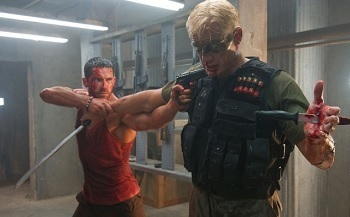
It's so manly that it makes everyone, regardless of their sexuality, want to sleep with Ally Walker.
Day of Reckoning is ceaselessly violent and, at the same rate, mysterious. The primary stars of the series, Van Damme and Lundgren, are barely in it at all, with Van Damme taking the role of the villainous leader of a cult of super soldiers. He is the Colonel Kurtz of roundhouse kicks, and his performances in Regeneration and Day of Reckoning are legitimately notable, and even more impressive considering that this is the same character who was the worst part of Universal Soldier: The Return.
Instead of focusing on Van Damme, which would follow the stale trend of action films continuously trying to derive their success off the aging bodies of men who haven't been relevant in two decades, Day of Reckoning is more concerned with Scott Adkins, a genuinely likable and talented actor/martial artist, and Andrei Arlovski, an amazing MMA fighter. Watching the scene below is the manliest part of the week for anyone who isn't Adkins or Arlovski.
The people behind the last two Universal Soldier films are less concerned with feeding the egos of Guile and Ivan Drago and more interested in producing a solid movie. They not only serve to pass the torch to newer action heroes but also to people who are currently making, or are interested in one day making, action films. The success of Universal Soldier: Regeneration and Day of Reckoning lets future directors and writers know that just because you're starting off with shit, it doesn't mean that you can't at least take a shot at improving it.
Daniel wants to talk about Gamera. YOU want to talk about Gamera. Find your giant turtle soulmate on Twitter.
For more from Daniel, check out 5 Ways Hollywood Ruins Its Own Main Characters. And then check out How 22 Movie & TV Franchises Would End If They Had Balls.
Are you on reddit? Check it: We are too! Click on over to our best of Cracked subreddit.